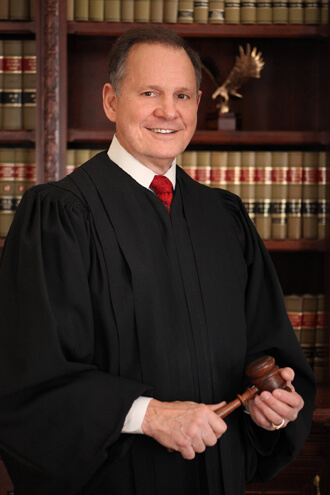ILLUSTRATION BY MICHAEL SHIREY
BY PAUL SCHINDLER | The Alabama Supreme Court, in a 7-1 ruling that will likely sow the very confusion the court claims to be trying to counter, has ordered probate court judges in that state’s 67 counties to stop issuing what the majority combatively referred to as “purported 'marriage licenses'” to same-sex couples, despite rulings from a federal district court striking down that state’s ban on gay marriage.
The state high court ruling, issued in the early evening of March 3, asserts that while “state courts on federal questions are ultimately subject to review by the United States Supreme Court… state courts may interpret the United States Constitution independently from, and even contrary to, federal courts.” Citing an earlier Alabama ruling, the court, in an unsigned opinion, wrote, “Legal principles and holdings from inferior federal courts have no controlling effect here, although they can serve as persuasive authority.”
According to the State Supreme Court, probate judges, the Alabama officials responsible for issuing marriage licenses, are not bound by rulings issued January 23 and 27, in two marriage equality cases, by US District Judge Callie V.S. Granade of Alabama’s Southern District. Instead, they are obligated to continue upholding the state constitutional ban on same-sex marriage.
One possible exception to the court's ruling is the probate judge in Mobile County, whom Granade specifically ordered to issue licenses after the successful plaintiffs in the case decided January 27 were denied them. The Alabama Supreme Court ordered the Mobile official, Don Davis, to respond by March 5 as to whether he is under any federal order to issue more licenses than have already been granted. Whether this leaves open the possibility that the federal court will respond to the Alabama court with more directives to individual probate judges is unclear.
As marriage equality spread to 17 other states since the US Supreme Court, in early October, declined to review marriage equality rulings from three circuit courts of appeal, none of those states have gone down the path that the Alabama Supreme Court is prescribing there. As it has done consistently since early October, the US Supreme Court, on February 9, declined to block Granade’s rulings from taking effect. Same-sex couples in Alabama began receiving marriage licenses the same day.
Calling the case before the Alabama Supreme Court “a manipulated lawsuit,” Evan Wolfson, president of Freedom to Marry, issued a statement saying, “The Alabama Supreme Court has done a disservice to itself, not to mention a massive injustice to the people of Alabama, in allowing itself to be used to temporarily obstruct the freedom to marry and the enforcement of the constitution’s guarantees…. The probate judges who are caught in the middle will be looking for guidance, and I am confident that the federal courts — and soon the US Supreme Court — will provide it.”
The Alabama high court’s action came on a petition from two anti-gay groups — the Alabama Policy Institute (API) and the Alabama Citizens Action Program (ALCAP). Some observers were surprised the court entertained the petition, given that the two groups, without a direct personal stake in the issue, might not be granted standing to proceed. The court, however, found that since the groups’ petition was “filed in the name of the State for the purpose of securing performance by public officials of a duty owed to the public, not in the name of a private party to enforce a private right or duty,” they did have standing.
The successful plaintiffs in the January 23 ruling, Cari Searcy and Kimberly McKeand, with their son K.S. | FREEDOM TO MARRY
The seven justices in the majority clearly welcomed the opportunity to step into a situation which the opinion paints as chaotic, with some counties issuing licenses to same-sex and different-sex couples (roughly three-quarters of them), some issuing only to opposite-sex couples, and some refraining from issuing licenses at all –– perhaps until the US Supreme Court resolves the matter nationwide.
“The ‘magnitude and importance’ of the issue before us is unparalleled,” according to the court’s opinion. “And the ‘special reasons’ that compel us to act are unlike any other in the history of our jurisprudence.”
Given the Alabama court’s refusal to recognize the superior authority of the US district court on the underlying question at hand, it proceeded to analyze the federal constitutional issues at stake.
On the question of whether banning marriage by same-sex couples violated their equal protection rights, the Alabama majority found a rational basis for such a ban in what it found to be the basic role of marriage –– “recognizing and encouraging the ties between children and their biological parents.” The court's posture leaves unaddressed the legal ties between same-sex couples and their children. Marriage is and always has been, the court found, “inherently a unique relationship between a man and a woman.”
The court rejected any approach that would subject the state’s marriage ban to a stricter level of scrutiny. Though sex discrimination may merit heightened scrutiny by the courts, the Alabama majority concluded, “All men and all women are equally entitled to enter the institution of marriage. Only by redefining the term ‘marriage’ to mean something it is not (and in the process assuming an answer as part of the question), can this statement be challenged. Put in the negative, traditional-marriage laws do not discriminate on the basis of gender because all men and all women are equally restricted to marriage between the opposite sexes.”
Sexual orientation discrimination claims are not subject to heightened scrutiny, the Alabama court concluded, noting the lack of a US Supreme Court precedent to the contrary. From an equal protection standpoint, then, the need to steer procreation into stable family environments provided a defensible rational basis for limiting marriage to unions of a man and a woman.
Alabama Supreme Court Chief Justice Roy Moore. | ALABAMA SUPREME COURT
The Alabama court also rejected the due process argument accepted by some federal courts that have ruled that government bans on same-sex marriage, lacking a “compelling” rationale, violate the fundamental right to marry the Supreme Court has identified on numerous occasions. Here again, the Alabama court insisted that accepting the due process argument requires first that marriage be redefined.
“What the federal district court ignored in these cases, however, is that the Supreme Court plainly was referring to traditional marriage when it proclaimed that marriage is a fundamental right,” the majority opinion read. “Thus, what the federal district court has done is to declare an entirely new concept of ‘marriage’ a fundamental right under the guise of the previously understood meaning of that institution. It is, plainly and simply, circular reasoning –– it assumes the conclusion of the matter.”
The one dissenter, Justice Greg Shaw, faulted the majority both on the question of the petitioners’ standing and on whether the court had jurisdiction over the question before it.
Chief Justice Roy Moore, who has been beating the drum loudly against Granade’s rulings since they were first issued and earlier, in his role as administrative head of the state’s judiciary, ordered probate judges not to issue licenses, recused himself from this case. In the end, that hardly mattered.
What comes next –– in terms of the reaction from probate judges and from the federal district court –– is anyone’s guess. Several weeks ago, in comments to Gay City News, Randall Marshall, legal director at the American Civil Liberties Union of Alabama, acknowledged the potential havoc such a ruling could create. “It would be very disconcerting for a probate judge to receive an order from the State Supreme Court and disregard it,” he said.







































